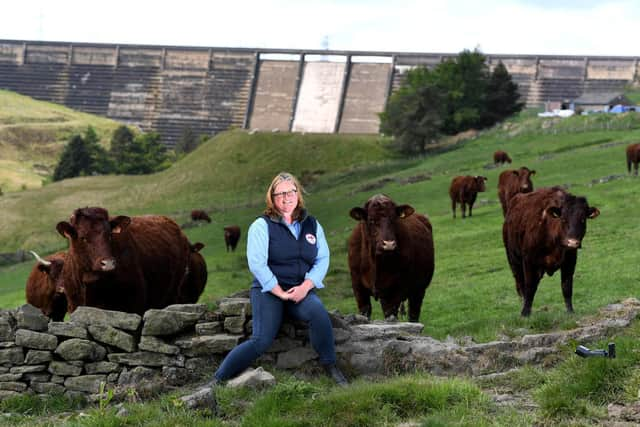Seniror farming figure in Calderdale says ‘big changes area ahead’ for farmers
and live on Freeview channel 276
Rachel Hallos, County Chairman of the West Riding NFU, said the UK’s departure from the European Union and its Common Agricultural Policy (CAP) was one of the major changes facing farmers that were “a little bit scary” but potentially “really exciting”.
The Government’s Agricultural Transition Plan phases out the old system of direct payments for farmers linked to land size under CAP and replaces it with a system where they are rewarded for delivering additional public goods that improve the environment. As of yesterday, a seven-year transition is under way from EU-based rules and towards a system in which the
Advertisement
Hide AdAdvertisement
Hide AdGovernment pays farmers to improve the environment, improve animal health and welfare and reduce carbon emissions.


Mrs Hallos, who farms with husband Stephen at the Yorkshire Water-tenanted, 2,000-acre Beeston Hall Farm, near Ripponden, said she believed British farmers would have to stay “reasonably aligned” with European rules in order for the country to maintain trading relations with the continent.
And the agreement of a Brexit deal on December 24 meant the UK will retain tariff-free access to the EU’s markets, a vital outcome for the food and farming sector and particularly for those such as sheep farmers who rely on the export market.
Mrs Hallos said the Government wanted farmers to play more of a role in protecting the environment but had not yet provided much detail on the Environmental Land Management Scheme which sets out how they will be paid for this work.
Advertisement
Hide AdAdvertisement
Hide AdShe said: “On the other hand, within another part of government, they’re also looking to be able to feed the nation cheaply.
“So there’s big changes ahead and for Yorkshire, we’ve got a pretty good local food supply chain, we’ve got some of the biggest retailers headquartered in Yorkshire, we’ve got Morrison’s and Asda, both of which are committed to buying British for their consumers. And that’s got to be a positive.
“So there’s a lot of things that are going to change, we are going to go through monumental change within our industry but there are tangible benefits that are going to be for all farmers I think in the long run, things are not going to stay the same.”
She added: “I think we need as an industry, we need clarity as to ‘what do you really mean, you policy people’.
Advertisement
Hide AdAdvertisement
Hide Ad“We need to know where we’re heading because we’ve been talking about this for four years now.
“Farming works in lifecycles. And we need to be able to plan. Because what happens today on a farm will not come to fruition sometimes for 12 to 18 months. So we need some clarity now, stop beating around the bush.”
In the foreword to a guide setting out the changes, published last year, Farming Minister Victoria Prentis admitted “changes of this significance can be intimidating”.
She added: “It is natural that many farmers are worried about the phasing out of Direct Payments.
Advertisement
Hide AdAdvertisement
Hide Ad“We will move to the new system gradually, and make changes where needed if the new policies do not work as intended. It is vital that farmers have time to adapt.
“The same amount will be available to the sector, though the way it is distributed will change.”